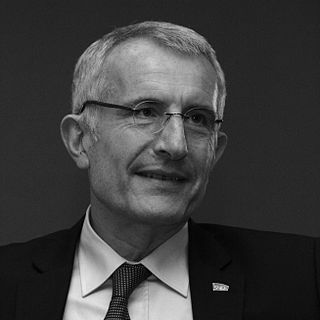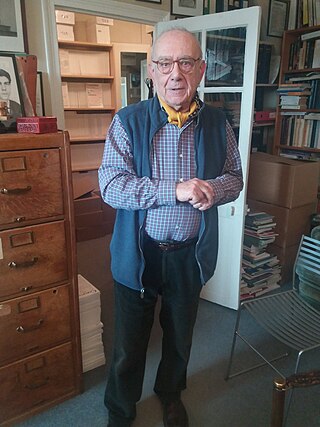
Sciences Po or Sciences Po Paris, also known as the Paris Institute of Political Studies, is a private and public research university located in Paris, France, that holds the status of grande école and the legal status of grand établissement. The university's undergraduate program is taught on the Paris campus as well as on the decentralized campuses in Dijon, Le Havre, Menton, Nancy, Poitiers and Reims, each with their own academic program focused on a geopolitical part of the world. While Sciences Po historically specialized in political science, it progressively expanded to other social sciences such as economics, law and sociology.

The Institut d'Etudes Politiques de Rennes also known as Sciences Po Rennes, is a French university established in 1991 in Rennes, the regional capital of Brittany. The institution is one of 10 political science institutes in France and is considered one of the grandes écoles.
Instituts d'études politiques, or IEP's, colloqually referred to as Sciences Po, are ten publicly owned institutions of higher learning in France. They are located in Aix-en-Provence, Bordeaux, Grenoble, Lille, Lyon, Paris, Rennes, Strasbourg and Toulouse, and since 2014 Saint-Germain-en-Laye. Their vocation is the study and research of contemporary political science. All students at the IEPs study a curriculum that is highly practical and broad-based, focusing on the full range of the social sciences across law, economics, finance, and management. These schools are considered as some of the most selective in France, mainly because they are the place where many political and business leaders are trained.
The Grenoble Institute of Political Studies, also known as Sciences Po Grenoble, is a French "grande école" of political science and more broadly of social sciences located in the campus of the University of Grenoble in Grenoble, France. It is administratively a subsidiary of the Université Grenoble Alpes.
Sciences Po Toulouse, or the Institut d'études politiques de Toulouse is one of the nine Institutes of Political Studies of France. Based in the center of Toulouse, France, next to the Université Toulouse 1 Capitole, this highly selective political science grande école was founded by a Decree in 1948 under the name of Institut d'études politiques de l'université de Toulouse. Since 2004 the courses have been 5 years long.
The Institut d'Études politiques de Lyon also known as Sciences Po Lyon, is a grande école located in Lyon, France. It is one of eleven Institutes of Political Studies in France, and was established in 1948 by Charles de Gaulle's provisional government following the model of the École Libre des Sciences Politiques. It is located at the Centre Berthelot within the buildings of a former military health college and operates as an autonomous institution within the University of Lyon. It is the first Institute of Political Studies to have joined the prestigious Conférence des Grandes écoles.

Dominique Reynié is a French academic. He is a professor of political science at the Institut d'Etudes Politiques de Paris.

Alexandre Parodi [aliases Quartus and Cérat] was a French senior civil servant, a member of the French resistance, General de Gaulle's appointee in charge of the French provisional government during World War II, a politician, permanent representative to the United Nations and NATO and the first French ambassador to Morocco.

Jean-Marc Coicaud is a French and American legal and political theorist focusing on global issues, among numerous other topics. He is Professor of Law and Global Affairs at Rutgers University and a Global Ethics Fellow at the Carnegie Council for Ethics in International Affairs. He is an elected member of the Academia Europaea. Over the years, he has lived and worked in Europe, the Americas, and Asia. His professional trajectory has combined serving as a policy practitioner at the national, regional, and global levels, and as a scholar and professor in academia.

Guillaume Pepy is a high-ranking French civil servant who currently serves as president of the SNCF, the French national rail authority. He is also chairman of Eurostar and deputy-chairman of the Keolis Group.

Gérard Paul Errera is a French diplomat and serves as an advisor to a number of American, Chinese and French international firms.

The Paris School of International Affairs (PSIA) is a graduate school of Sciences Po (also referred to as the Institut d'études politiques de Paris) based in Paris, France, and is one of the most prestigious graduate schools for international relations. Located in the Saint-Germain-des-Prés neighborhood in the 7th arrondissement of Paris, the school has an international student population of 70%, with 1200 students coming from over 110 countries.

Tornike Gordadze is a former Georgian minister and French political scientist. He was Georgia's State Minister for Euro-Atlantic Integration from August 24, 2012 to October 25, 2012.
Denis-Constant Martin is a French scholar.

Marie-Christine Kessler is a French political scientist. She is currently the emerita research director at the French National Centre for Scientific Research, and spent much of her career at the University of Paris II Panthéon-Assas. She studies the role of elites in shaping public policy, as well as French foreign policy.

Nonna Mayer is an academic French political scientist and researcher in political science. She is a research director at the CNRS, and a specialist of electoral sociology and of far right movements in France. She was president of the Association Française de Science Politique from 2005 to 2016.
Gilbert Guillaume is a French jurist and judge who served as the 19th President of the International Court of Justice (ICJ) in The Hague from 2000 to 2003. He was an ICJ Judge between 1987 and 2005. Guillaume was previously appointed a member of the Permanent Court of Arbitration (PCA) in 1980.

Jean-Claude Casanova is a French economist, educator and public intellectual with a lifetime involvement in French civic life. He was the chairman of the Fondation Nationale des Sciences Politiques between 2007 and 2016. A centrist in politics, he cofounded the journal Commentaire with Raymond Aron in 1978, and since then has been its editor and publisher (directeur).
Laurent Bigorgne is a French essayist. He was the Director of the Institut Montaigne from 2010 until 27 February 2022.
Jean-Pierre Machelon was a French academic and jurist who specialised in public law. He was dean of the faculty of law at Paris Descartes University.













